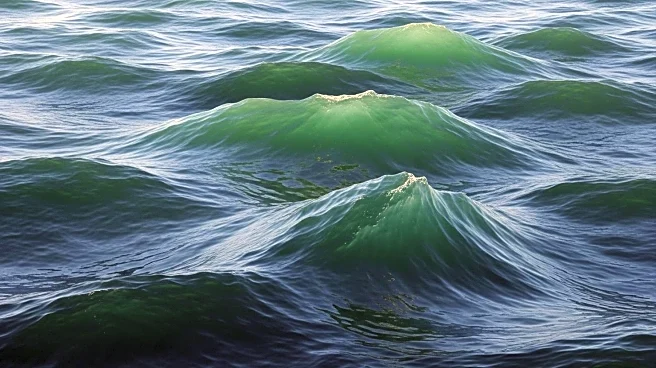What is the story about?
What's Happening?
Recent research highlights the significant impact of marine heatwaves on ocean food webs and carbon transport, potentially affecting the ocean's ability to mitigate climate change. Conducted by an interdisciplinary team from institutions including MBARI and the University of Miami, the study focused on the Gulf of Alaska, which experienced two major marine heatwaves from 2013 to 2015 and 2019 to 2020. These heatwaves disrupted the biological carbon pump, a process where microscopic organisms like plankton transport carbon from the ocean surface to the deep sea. The study found that during these heatwaves, carbon particles accumulated at shallower depths rather than sinking to the deep ocean, which could lead to more carbon returning to the atmosphere.
Why It's Important?
The findings underscore the critical role of marine ecosystems in global carbon cycling and climate regulation. As marine heatwaves become more frequent and intense due to climate change, the ocean's capacity to sequester carbon could diminish, accelerating global warming. This has broader implications for climate policy and the need for sustained ocean monitoring to predict and mitigate the impacts of such heatwaves. The disruption of the ocean's carbon pump could also affect marine biodiversity and fisheries, impacting food security and economies reliant on marine resources.
What's Next?
The study calls for enhanced long-term monitoring of ocean conditions to better understand and predict the impacts of marine heatwaves. This includes using advanced technologies like robotic floats and genetic sequencing to track changes in ocean chemistry and biology. Such efforts are crucial for developing strategies to protect marine ecosystems and maintain their role in climate regulation. Policymakers and environmental organizations may need to consider these findings in future climate action plans and conservation efforts.
Beyond the Headlines
The research highlights the interconnectedness of marine ecosystems and climate systems, emphasizing the need for interdisciplinary approaches to environmental challenges. It also points to the potential for technological innovation in ocean monitoring, which could provide new insights into the health of marine environments and inform global climate strategies.

















